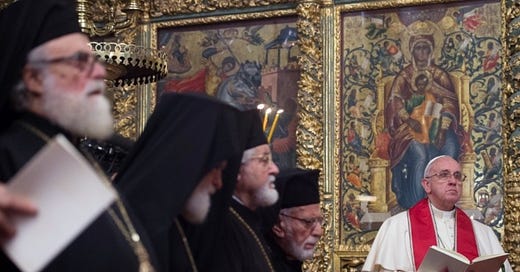
Is Pope Francis going to Nicaea?
Ecumenical Patriarch Bartholomew I said that the pope is planning a 2025 visit to Turkey
The Orthodox Ecumenical Patriarch of Constantinople made a surprise announcement Thursday, during a visit to Lisbon, Portugal, when he said that Pope Francis is hoping to visit Turkey in 2025.
Though the visit has not been confirmed by the Vatican, Patriarch Bartholomew I explained May 16 that there is already a mixed Orthodox-Catholic commission working on the details.
Francis is planning to travel to Turkey for the second time in his pontificate for the celebration of the 1,700th anniversary of the Council of Nicaea, which took place in what is now the Turkish city of Iznik.
“Next year is the 1,700th anniversary of the first ecumenical council in Nicaea, currently Iznik, not far from Istanbul,” the patriarch told a group of journalists in Lisbon.
“His Holiness Pope Francis wants to celebrate this very important anniversary together, and he plans to come to our country to visit with us in Constantinople at the Patriarchate, and then proceed together to Nicaea to have some important celebrations on this anniversary.”
“We have formed a mixed commission with four Catholics and four Orthodox to meet a few days from now in Istanbul, to arrange all the details of this important meeting to take place next year. Of course, as a head of state, His Holiness Pope Francis will contact the Turkish government for his visit and his involvement in these coming celebrations.”
What is so special about Nicaea?
The Council at Nicaea is regarded among Christians as the first historic ecumenical council.
It was convened by then Roman Emperor Constantine, at a time when Christianity had begun to be tolerated and even promoted in the Roman Empire, though it would be 55 more years until it became the official religion.
Constantine wanted to settle theological issues pertaining to the nature of Jesus as the Son of God, fearing that growing disagreements on the subject might disrupt the peace. One of the results of the council was the formulation of the Nicene Creed.
Why would Catholics celebrate that with the Orthodox?
Despite existing and complex theological and doctrinal difference, ecumenical relations between the Orthodox and the Catholic Church have, arguably, never been better than they are now.
A new era of relations based on friendship and a cultivation of mutual trust began when Pope St. Paul VI met with in 1964 with Ecumenical Patriarch Athenagoras in Jerusalem, where the two embraced, promising to work together to overcome division.
In addition to the upcoming anniversary of Nicaea, the Church this century will observe a millennium since the schism of 1054, which marked a definitive break in communion between Christians of the East and West.
Pope Francis has emphasized in his pontificate a desire to foster communion and friendship by celebrating those things that Orthodox and Catholics have in common, and Nicaea is a major example.
When might the trip take place?
The ecumenical council at Nicaea ran from May to August of the year 325, so a visit in either of those two months would make the most sense — to mark eith the opening or the closing.
Since the pope is prone to traveling in the summer months, an August visit seems likely, though there is no indication that a date has actually been set.
Could anything derail the visit?
One concern, of course, is the health of both prelates. Bartholomew, though in good shape, will be 85 years old in 2025, and Francis, who has been plagued by health issues in the past few years which have led to the postponing or canceling of trips, will be 88.
And for the visit to take place the Vatican will have to secure the agreement of the Turkish government.
Turkey is led by Racep Tayyip Erdoğan, an Islamist-leaning populist leader with autocratic tendencies who only last week converted another ancient Byzantine Church into a mosque. Relations between the Ecumenical Patriarchate and the Turkish government have historically been tense, but it is very unlikely that Erdogan would miss the opportunity to host the Pope on such an important occasion.
Turkey and the Holy See have good diplomatic relations and the country has been visited by Paul VI, John Paul II and Benedict XVI.
If Francis makes the trip, he will be the first pope to visit Turkey twice. The first visit was in 2014, to mark the feast of St Andrew, the Patron of the Patriarchate of Constantinople.
What should we expect to happen next?
With the Patriarchate and Rome already working on details for the visit, the next logical step will be for the Vatican to ask the Turkish Government to issue a formal invitation for the pope to visit. If that happens, it will be a sign that the visit is – barring any unforeseen circumstances – going ahead.










I am so heartened by this. For all of the thoughts about the Holy Father and his legacy, his efforts here should be celebrated. Unity is the desire of Christ himself and we should be grateful for a pope who has committed great effort to it.
The country's Christian population has been wiped out, declining from perhaps 10%-20% of the population to less than 1% of the population since 1900.